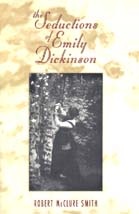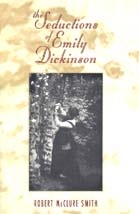What makes Emily Dickinson such a fascinating poet? Although
she left no personal poetics, she did define her own response to poetry
as an immediate sensual reaction: "If I read a book [and] it makes
my whole body so cold no fire can ever warm me I know that is poetry. If
I feel physically as if the top of my head were taken off, I know that
is poetry" (L. 342a). Presumably, her own poetry is most significant
not in what it communicates to a reader, but in what it does to a reader.
Is the continued popular success of that poetry not conclusive evidence
of its capacity to elicit a similarly spontaneous, visceral response from
its readers? And is Dickinson's critical reception not the visible proof
of the perpetuation of a powerful (and uncanny) reading seduction?
Relocating Dickinson within her own culture reveals the
genesis of her rhetoric of seduction. But the consequences of the rhetorical
"seduction" of antebellum readers still impact readers today.
Why do critical studies of the poet so often identify her as the classic
analysand, the female hysteric? Because transference is frequently the
engine of analysis, misshaping the reader's relationship with the text
by introducing a past scene of seduction into a present interpretive context.






